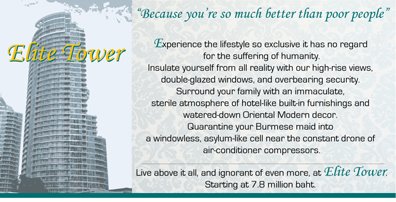BANGKOK – Facing the very real possibility of an energy crisis during April’s hot season, the government has initiated a preventive measure by mandating that public air-conditioned spaces no longer be chilled to sub-zero temperatures.
“We must all make sacrifices for the common good, even if it means changing our way of life,” said Energy Minister Pongsak Ruktapongpisal yesterday. “I know that excessive air conditioning is a long-standing part of our national culture, but we must adapt to a new world.”

Effective immediately, all thermostats in offices and malls in the nation’s capital have to be set to a minimum of 5 degrees Celsius, with violators fined up to ฿100,000.
According to a recent study, Bangkok mall and office temperatures are among the lowest in the developed world, surpassed only by Singapore. The ministry estimates that raising the ambient temperatures to a suitably-cool average of 7C would reduce city energy consumption by as much as 35%.
Response to the mandate has been generally positive, but notable protests have come from the Mall Group and Gaysorn Group, owners of the Emporium and Gaysorn Plaza respectively.
“We cater to a very exclusive clientele,” said Jinasoon Suwaravasin, executive VP of Customer Relations at Gaysorn. “Our elite shoppers need sub-zero temperatures in order to comfortably walk among couture boutiques wearing inappropriately ostentatious designer jackets and boots.”
“And how do you expect a khunying to try on a wool Prada pea coat unless the shop can duplicate the climate of her upcoming Copenhagen vacation?” she added.
Despite the pleas from retailers for a 30-day grace period, or until “winter sales season ends,” the Yingluck government stood firm on the new law.
“I myself have decided to switch to Dolce and Gabbana’s Spring Collection a month earlier than usual,” said the prime minister at a press conference. “We all have to make sacrifices.”


